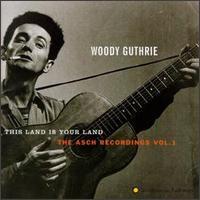Okay, so Woody Guthrie *might* not be a punk, and you can't get much more mainstream than writing a song that becomes an alternate national anthem, but gosh darnit I'm going to review this album anyways (also, Joe Strummer used to go by Woody in tribute, which should in itself extinguish all questions).
This Land Is Your Land: The Asch Recordings, Vol. 1 is a compilation of many of Woody's most celebrated songs throughout his career. A folk singer at his prime in the 1940s, much of his inspiration for his songs came from the suffering he witnessed and experienced during the Dust Bowl, a series of grueling dust storms in the Great Plains in the mid-1930s that severely affected the area's agricultural prospects. Now that the history lesson is over (thanks for bearing with me), I'll move on to the actual review. I'll only delve into a few select tracks, as there are nearly thirty on the disc. Besides, everyone knows his musical style (I hope): nasal vocal tone, full-chord strum, and the occasional harmonica accompaniment.
The album begins with "This Land Is Your Land," the aforementioned anthem. This version is solid, although it doesn't contain the controversial verse. This omission really disappointed me, as it truly is a poignant criticism of American greed as exhibited through property rights back when such a thing was quite unusual. Fortunately though, another version of the song (the second of three) appearing later on in the album does contain the verse. For those unfamiliar, it goes a little somethin' like this:
I roamed and rambled and followed my footsteps / To the sparkling sands of her diamond deserts / All around me her voice was sounding / This land was made for you and me / There was a big high wall there / That tried to stop me / The sign was painted / It said âprivate property' / But on the backside / It didn't say nothing / This land was made for you and meMoving on a few tracks we have a cover of a Goebel Reeves song called "Hobo's Lullaby." Here, the singer empathizes with a hobo who is fortunate enough to have a boxcar to sleep in on a given night. This is something Woody undoubtedly had experience with himself, and listening to him sing this makes me feel like I am right beside him on a boxcar in the mid-`40s, hitchin' aimlessly through the country. This is a great song, and it is rumored that it was Woody's favorite song ever. The singer calls to the hobo:
Go to sleep you weary hobo / Let the towns drift slowly by / Can't you hear the steel rail humming / That's a hobo's lullaby / Do not think about tomorrow / Let tomorrow come and go / Tonight you're in a nice warm boxcar / Safe from all the wind and snowFollowing "Hobo's Lullaby" is "Pastures of Plenty," another fantastic cut. The song, originally appearing on his classic Ballads from the Dust Bowl, is an angry yet hopeful assertion of how the migrant workers of the 1940s will rise up and return the land to the masses rather than continue to slave for the few. Woody proclaims:
Every state in the Union us migrants have been / We'll work in this fight and we'll fight till we win / It's always we rambled, that river and I / All along your green valley, I will work till I die / My land I'll defend with my life if need be / Cause my pastures of plenty must always be freeThe last song I'll mention is "Do Re Mi." Another song about the struggles associated with the Dust Bowl, this number attacks the American value system of money over human life. People in the thick of the Dust Bowl would leave for California where a better life could be obtained, only to be turned away or neglected their humanity for not having enough money.
If you ain't got the do re mi, folks, you ain't got the do re mi / You better get back to beautiful Texas, Kansas, Georgia, Tennessee / California is a garden of Eden, a paradise to live in or see / But believe it or not, you won't find it so hot / If you ain't got the do re miI have at this point covered my personal favorites from the first half of the album, and there are many more great songs ahead that would simply be excessive to explore. Woody Guthrie is certainly an acquired taste, especially for the 30-and-under crowd, many of whom likely think of him as ancient. The messages underlying the circumstances of his songs are timeless, however, and they will grow on you if you give them the opportunity. I highly recommend this for those who dont mind warming up to an album and for those who like to take a break from the distortion pedal every once in awhile.
